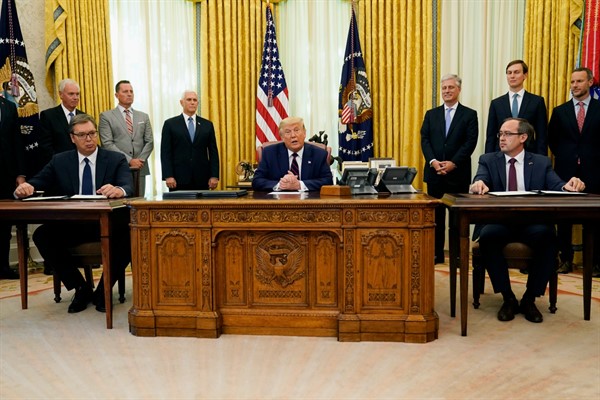The recent U.S.-brokered agreements between Serbia and Kosovo to normalize their economic ties have been portrayed by all three governments as a momentous diplomatic achievement. “By focusing on job creation and economic growth, the two countries were able to reach a major breakthrough,” President Donald Trump said at a White House signing ceremony in September, standing alongside Serbian President Aleksandar Vucic and Kosovar Prime Minister Avdullah Hoti. Both leaders committed to moving forward on direct transportation links and other infrastructure projects, with the hope of boosting economic development, particularly in Kosovo, one of the poorest countries in Europe.
The announcement came as the European Union tries to advance its own parallel talks with Serbia and Kosovo, aimed at getting them back to the table after negotiations broke down two years ago. The EU has been mediating between the two countries since 2008, when majority ethnic-Albanian Kosovo unilaterally declared independence from Serbia. Belgrade has staunchly refused to recognize Kosovo and has successfully thwarted its efforts to gain membership in the United Nations and other international bodies. While the White House claims it coordinated the recent economic deals with EU officials, there are signs that Brussels is viewing America’s efforts as an unwarranted encroachment.
During the Kosovo War of the late 1990s, it was the U.S. that became heavily involved in the region, spearheading a NATO military intervention to put an end to the strife, while the EU lacked a common foreign policy for the Balkans. However, over the past decade, Brussels has been working hard to bring the region firmly into its sphere of influence, with Washington mostly happy to focus on foreign policy priorities in other parts of the world. The EU’s ability to independently mediate the conflict between Serbia and Kosovo, with the aim of eventually helping them normalize their relations, was seen as an important step toward consolidating its leadership role in the region and preventing it from aligning too closely with Russia and China.

